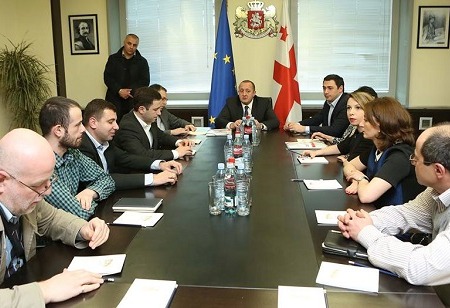President discusses surveillance laws

Georgians feel insecure in terms of privacy when it comes to their phone communication.
This applied to conversations that purely contained information about private life secrets and conversations of critical political nature.
The results of a public opinion poll conducted by Transparency International Georgia revealed 69% of respondents would not discuss critical political opinions on the phone.
In addition, 63% of those surveyed said they would not share a private secret with friends over the phone.
Representatives of Transparency International Georgia and several other non-governmental organisations met with Georgian President Giorgi Margvelashvili today and discussed the Government’s capabilities to carry out illegal surveillance on Georgian citizens.
The group said the present laws could not protect Georgian citizens from being illegally spied on, and called the Government to create rules to ensure proper judicial oversight over Government surveillance practices.
"The state is obliged to keep order and protect human rights. The balance between these two issues should be guaranteed by law,” Margvelashvili said, adding the only way to keep this balance was through dialogue.
He called on all interested sides to get involved in discussions about the topic.
This month, a dozen Georgian civil society organisations have teamed up in a campaign, called This Affects You, aimed to establish a mechanism that would rein in the Government’s capabilities to carry out illegal surveillance.
The issue of illegal surveillance has become subject of intense discussion in Georgia following the revelation thousands of secret video recordings were kept by the former government of Georgia.
Earlier this month, Georgia’s Public Defender UchaNanuashvili said the Government still had the ability to conduct illegal surveillance on Georgian citizens but did not know if the Government used it in practice.
 Tweet
Tweet  Share
Share